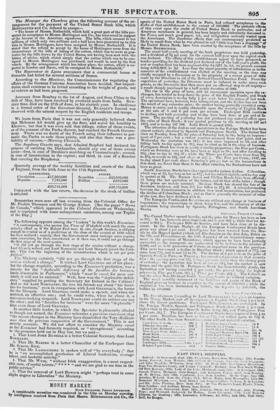The following appears among the " leaders " in this
week's Examiner.
"A contemporary, who quotes the Vicar of Wakfield with much the same unlucky effect as if Sir Robert Peel were to cite Joseph Surface, is obliging enough to remind us of a prediction at the close of the session of 1838 which has been realized ; namely, that the Government must undergo some repairs, sonic renovation, for that, constituted as it then was, it could not go through the first stage of the next session.
" It did not go through the first stage of the session without a change. Lord Glenelg retired, and Lord Normanby and Lord alorpeth joined the Cabi- net. This was the beginning of the reconstruction which is not yet quite foist( d."
Ministry certainly "did not go through the first stage of the session without a change." It tricked Lord GLENELO out of his place ; but the change requisite, according to the Examiner's prediction, was a remedy for the " deplorable deficienq of the faculties for business, lately observable in Parliament," which "must be cured, for most cer- tainly it will not be endured." Well, how was the "deplorable defici- ency" supplied by putting the Secretary for Ireland in the Cabinet? And as for Lord NORMANDY, the less his friends say about "his facul- ties the business," even in comparison with Lord GLENELG'S, the better for the Marquis. Lord GLENELG could make a speech, and when sti- mulated, an effective one ; and he could write, when he chose it, a statesman-looking despatch. Lord NORMANDY could do neither one nor the other ; and his " faculties for business" were far more "deplorable" than even those of Lord GLENELO.
In another little leader, in which the Spectator is pleasantly alluded to though not named, the Examiner reiterates a previous statement, that "the recent changes in the Ministry have dissatisfied the Tory-Radicals more than the previous composition of the Government." This is not strictly accurate. We did not affect to consider the Ministry cured as the Examiner had formerly required, or " strengthened" according to the promises held out in May last, but we said- ]. That Lord JOHN RUSSELL is a better Colonial Secretary than Lord NORMANDY.
2. That Mr. BARING is a better Chancellor of the Exchequer than Mr. SPRING RICE.
3. That Mr. LAnoucricuE is spoken well of "by everybody ;" that he is "an accomplished gentleman of Liberal tendencies, average talent, and laudable activity." 4. That Mr. WYSE, "without Irish exaggeration, is a most respect- able man, of useful talents ;" ** * * " and we are glad to see him in the public service."
5. That the removal of Lord FIowicit might "perhaps tend in some slight degree to Liberalize " the Ministry.


























 Previous page
Previous page